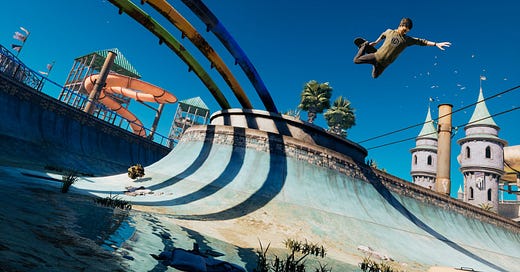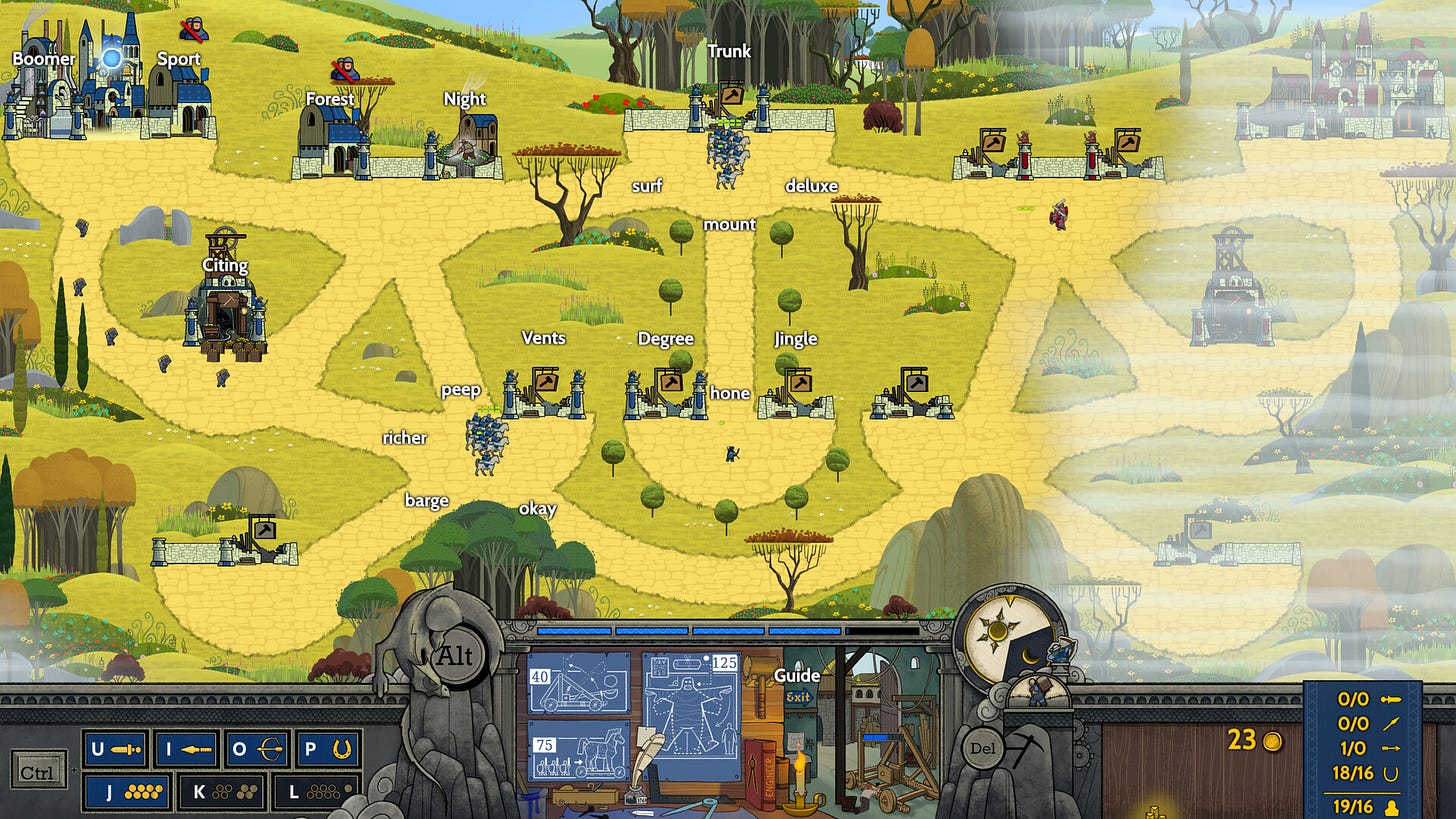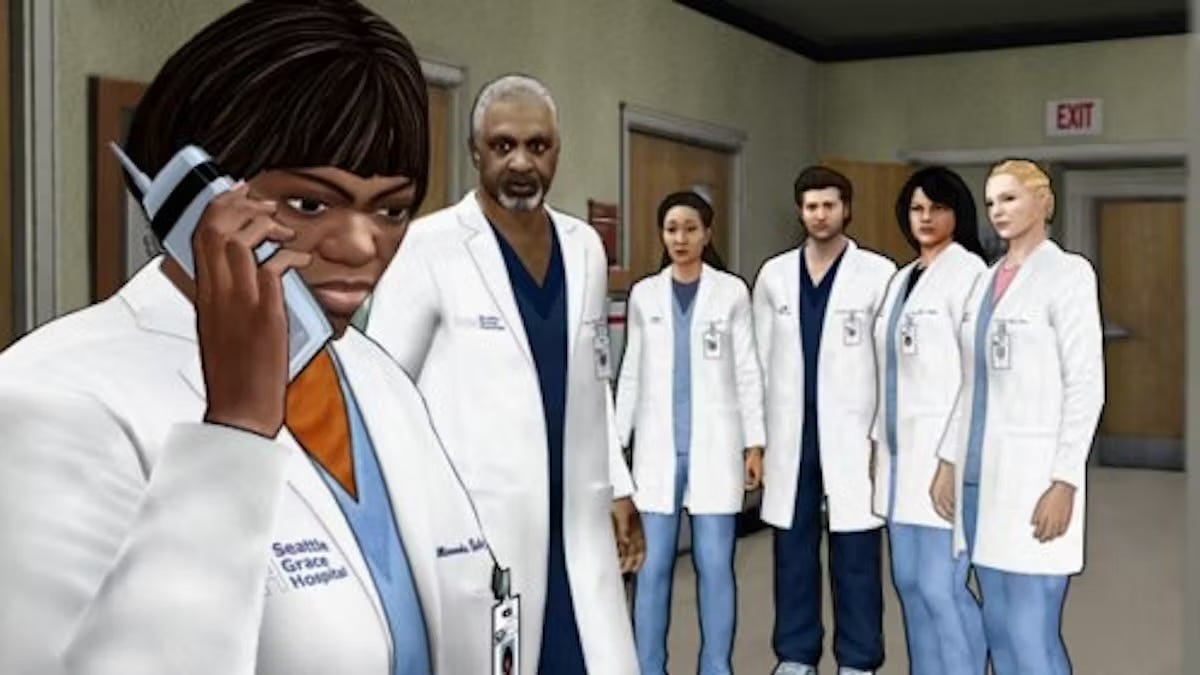Do A Kickflip
Plus 6 months of Steam Deck in Australia, an objectively correct opinion, and Capcom's Power Stone
Hello Press Any Button Pals and Paramours,
It’s nice when you have a week that reminds you why video games are fun, and I’ve gotta say that getting to preview Tony Hawk Pro Skater 3+4 last week reminded me (Alice), leaving me with a distinct “yay video games” vibe. It’s not about being good (I absolutely am not), but about enjoying the time you spend.
Speaking about enjoying the time you spend, nostalgia, and subtle changes of subject, today marks 20 years since the original Leeroy Jenkins video was posted on the internet. Normally it’s Tim that makes you feel old, so sorry for bringing that one out without warning.
In this week’s issue of Press Any Button, I talk about Tony Hawk Pro Skater 3+4, and why there should be more licensed games based on cheesy media. Meanwhile, Tim still loves his Steam Deck and retro brawler Power Stone. Plus some game recommendations.
Enjoy!
We can all breathe a sigh of relief: the Tony Hawk Pro Skater 3+4 remaster seems good
By Alice
We all have those games that made us fall in love with video games as a concept. The ones that live in the special nostalgia goggles section of your brain. For me, there are many pivotal titles, including Super Mario Land, American McGee’s Alice, Quake III Arena, Need For Speed, Guitar Hero, and Tony Hawk’s Pro Skater 2 and 3. I can see the origin for every game I came to love as an adult in the games I loved as a child and teen.
The Tony Hawk games were extra special. They blended music, bite size runs, challenges that ranged from reasonable to extreme, and addictive gameplay perfectly. I would spend my nights playing the same park over and over again.
So, when I was invited to go to LA to interview Tony Hawk, get a preview of the remaster of Tony Hawk 3+4 and go to a concert with some bands from the game, I obviously said yes.
The preview of the game was excellent. It played so well, looked great, and all the new additions I got to try, like the new Waterpark level, felt perfect. It was exactly what you’d want a Tony Hawk game to be, much like the Tony Hawk’s Pro Skater 1+2 remaster from a few years ago. I am so exited for the game to come out and for fans and new players to experience it. This is a game I’m going to get my daughter to play one day.
What surprised me, though, was just how bad I am at the game now. I’m going to tell myself it’s because I grew up playing the game on mouse and keyboard, and my controller reflexes aren’t there for this game yet, but we both know that’s a lie. I’ve played so much 1+2 on console that I should be better at this by now. There was a pro-player in the room raking up 3 million point combos, and laughing as he crashed out of 970,000 point combos, while I was lucky to scrape by on 50,000. Time wearies you, age is humbling, and playing a game in a room filled with the people who made it is daunting. However, this gives me the opportunity to get good again. I can rebuild from the ground up, and that’s exciting if I decide it is.
The other bit of good news is that the soundtrack is still so good, and the new additions only make it better. Lupe Fiasco’s skateboarding classic Kick, Push has been added (which feels like a perfect fit), along with pro-skateboarder Steve Caballero’s band Urethane (there’s just something about punk bands filled with people in their 50s/60s that feels extra punk rock). Fans and new players are in for a treat and I can’t wait for July.
What to play
New to Game Pass this week is licensed brawler Teenage Mutant Ninja Turtles: Mutants Unleashed, and brand new co-op sci-fi satirical shooter Revenge of the Savage Planet. Arriving on the service soon will be Warhammer: Vermintide 2, but the big fish is Doom: The Dark Ages which is due to arrive later in the week and will be on Game Pass day one.
Free on the Epic Games Store right now are Deadtime Defenders and Touch Type Tale. Deadtime Defenders is a side-scrolling looter shooter RPG, which sounds like the developers just threw darts at a board to pick the genre, but actually looks pretty fun. The game I’m (Alice) looking forward to trying the most, though, is Touch Type Tale, because it’s an RTS that rewards you for improving your touch typing. It continues in the footsteps of Mavis Beacon, and that weird koala game I had as a kid. I’m glad there are still touch typing games, and I will really enjoy intending to play this one.
Steam Deck’s the ultimate secondary console
By Tim
This week marks six months since Valve’s Steam Deck arrived in Australia, though obviously it’s been around in the US for longer. I’ve been reflecting on the way the Deck has really opened up my playing options, not just because it’s given me more access to Steam and its constant sales, or because it’s a great place to replay so many console favourites, but because it’s moved thousands of games from TV only experiences to handheld ones. Here I thought I’d highlight four games that I’ve especially enjoyed on Steam Deck and might not have otherwise played.
UFO 50: A collection of 50 new games, presented as though they were made for a fictional console in the 80s and 90s, UFO 50 is only on PC which is understandable but a shame. Still, thanks to the fact that the Steam Deck is a PC, I was able to play it on a CRT with some wireless retro-style controllers and it was sublime. Of course, I also played it on the go and on my 4K TV for some couch co-op.
Marvel’s Midnight Suns: I love X-COM and I love Marvel, so this tactics RPG from Firaxis is extremely up my alley. But I don’t have time for huge strategy games on console anymore so I gave it a miss, until I was able to pick it up in a Steam sale. Over time performance patches (and the removal of the 2K launcher) have made the Deck the ideal platform for this game, which it turns out is a masterful cards/tactics/romance mix with my favorite versions of several Marvel heroes.
Donut Dodo: I don’t even remember how I found out about this game, which is a beautiful arcade Donkey Kong like, but as soon as I saw it and heard its music I had to play it. For whatever reason it only seems to be offered on Switch in the US, so I took a chance on the Steam version despite its “Unknown” Deck compatibility. It runs flawlessly, and it rules.
Beyond Good & Evil: I know, I have no excuse for not having played this 2003 journalism Zelda-like until now, it simply slipped through the cracks. But playing the 20th Anniversary Edition on Steam Deck has been wonderful and I’m so glad I got to it here instead of getting it for Gamecube. I’ve had some real issues with Ubisoft games on Deck (several other big publishers are guilty of silly DRM and launchers too), but that’s my only complaint here.
Bricks, Boards and Beginnings
by Alice
I have a controversial opinion. An opinion that I am objectively right about: I think we need to have more licensed games based on TV shows. Not the free to play nonsense of the Stories style games we have now, I am still mad that Universal was essentially charging people $100 in $1 increments to access a full barely animated Xena Warrior Princess fan fiction. Also not games based on genuinely good TV prestige TV shows with beautiful visuals and deep stores.
I’m talking about proper, full sized video games, or at least decent add ons to regular games based on soaps, teen dramas and trashy TV. Like the Grey’s Anatomy video game, the CSI series, or even the Fast and the Furious Forza Horizon mini game. I want a soap opera time travel game based on The Way Home, an adventure RPG based on Legends of Tomorrow. I think there’s a good game idea in Gilmore Girls. What about a basketball game set in the One Tree Hill universe? Riverdale was essentially tailor made to be a video game, given how over the top and ridiculous it is. You could fight with Archie in the trenches of WWI, experience the highs and lows of high school football, and then be vampires or whatever that was supposed to be. There also needs to be a game based on House Hunters.
On the one hand, not everything should be a franchise, and we need more new games and other media based on original ideas that aren’t nakedly trying to appeal to our nostalgia. On the other hand, I want it. Isn’t that enough?
Retro Esoterica
by Tim
Capcom’s Power Stone and its sequel are most often described as platform brawlers in the same vein as Super Smash Bros, but I’m not sure that the description really does the games justice. For a start, the first Power Stone hit arcades in 1999, the same year as the first Smash, so it was developed concurrently based on some of the same influences rather than being derivative. It’s also an original world and set of characters rather than an all-star lineup of known characters. And, most importantly, it plays very differently.
The Power Stone games, which I’ve only ever played in their Dreamcast port form, are some of my favourite multiplayer arcade go-tos. I’m thinking about them right now because they’re going to be included in the Capcom Fighting Collection 2 this week, making them more accessible than they have been in 20 years.
The first game sees eight fighters (plus two unlockable) battling in arenas around the world as they fight for control of mystical stones. You can run and jump all around the 3D battlefields (locations include a London town square) pummelling your opponent with fists and feet or by grabbing whatever’s handy (trash cans, planter boxes) to smash over their heads. Importantly, the characters play very differently from the creepy knife-fighting Jack to the boxing Falcon. Treasure chests appear with weapons to wield, from flame-throwers to swords, as well as the titular Power Stones. Collect three and your character will transform into a powerful and often hilarious form that supercharges your moves and movement, while also giving you access to a devastating finisher.
It all feels so much faster than Smash, and with much more Arcade DNA. It gets some 1v1 sensibilities and absolutely outlandish cultural stereotypes from Street Fighter (one fighter that’s heavily Native American code transforms into a living totem pole), but its more chaotic nature and opportunistic weapon attacks from Final Fight, though it’s all given a quirky anime aesthetic and pushed into a 3D form. Other companies were experimenting with 3D brawlers at the same time (look at 1997’s Fighting Force), but the enclosed spaces, competitive setup and wild premise puts Power Stone a step ahead.
The sequel is even better, with more characters, new items and the option of four-player battles. Transformations are stranger, weapons are more diverse, and levels progress through various stages (for example starting in a plane, then falling through the sky, then onto a floating platform), which all combines for a sublimely manic multiplayer session.









